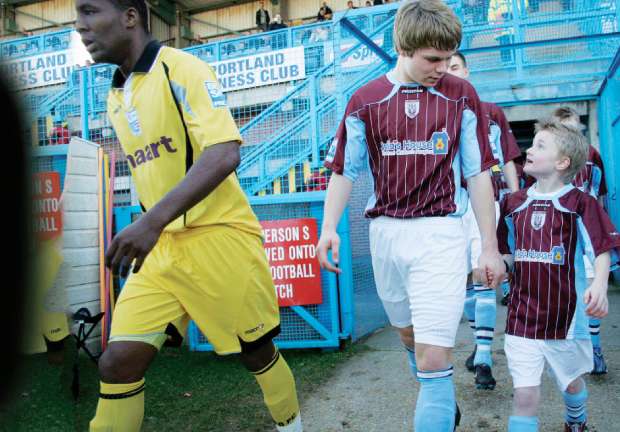Pic: Idris Martin
LAST week’s NLP reported on an investigation into two end of season matches in National League North.
Bookmakers experienced a heightened level of interest in two games, one of them being Stalybridge v Boston, so the Gambling Commission will now pull together information from all regulated bookmakers.
If they find sufficient cause for concern, they will take their findings to the FA.
I’d already quote prices long odds-on that even if it gets to an FA investigation (and it’s a big if), nobody will be found guilty. And here lies the problem, the catch all term of ‘match fixing’ is a complete red herring.
Imagine this, entirely plausible, scenario. Team A have an important cup fixture on a Wednesday evening. At Monday night’s training session the boss of Team A outlines his plans for the week ahead. He tells his assembled squad that he will be fielding a very strong team to land the prize of a trophy in midweek.
Scenario
He also states that because of this he would like to field a much changed line up on the Saturday in their league match. His reasons for doing so could be any of the following: they’ve secured a mid-table position in the league, it’s the end of the season, he wants younger players and those who haven’t had much game time this season to gain some experience. Or even all of the above.
At the same time, this entirely plausible, scenario could also play out during the week. Team A, for example, have a star striker who has been key to all the things they’ve done well this season. His mates have been begging him all year to try out this new local nightclub on a Friday night.
His professionalism has meant that he has declined this invite all year, wanting to be fresh and ready for matchday on a Saturday. This particular week he sends a message via a whatsapp group to his mates. It says he’ll be joining them on Friday night.
One mate responds with ‘why, haven’t you got a game on Saturday?’ – he replies ‘no the gaffer has picked the reserves and kids, we’ve got a bigger game on Wednesday’.
Perfectly plausible, but the player may have made a very slight breach of FA rules – if the team sheet intentions of Team A are NOT in the public domain.
If Team A’s local newspaper had run a story on Tuesday morning stating that the manager was prioritising the midweek cup tie and fielding a much changed team at the weekend, then the whatsapp conversation above would be entirely within the rules.
Tightrope
All of the above shows just how confusing the FA rules are and what a tightrope Non-League footballers are now walking because of them.
It’s of course right and proper that the FA ensure the game is clean, but as I have always maintained, the ban on all football betting for players – preventing a Ryman Premier player betting on Euro 2016 for instance – is ridiculous. When you throw in the team news angle above you would wonder how any player talks ‘football’ to anyone.
If Team A player’s friends now go and act on that information and back their mate’s side to have a heavy defeat on the Saturday, who is in the wrong? It’s very likely that bookmakers won’t have the info.
Non-League football for most firms, certainly below the National League is a loss leader. They will happily move prices when money comes in, but what is heightened activity?
Well, the best way I can describe it is like going to your newsagent to buy this Sunday morning’s paper and finding 50 people in there rather than the usual two or three. That’s when alarm as get raised – even if the cause is broadly innocent.
I’ve seen it happen before when participants were at fault. An end of season match in the 2008-09 Conference Premier season was fixed by a group of players to produce a half-time score in favour of one team and a full-time score in favour of the other. The odds for such a dramatic switch in a match is around 33/1.
Those guys got greedy and it was obvious when bookmakers saw more money going on this market than for an equivalent market in a World Cup or Champions League final.
Bookies aren’t stupid and monitor each market for things out of the ordinary. This one was off the scale.
Yet a 14-month investigation from authorities (who I maintain did not know what they were actually looking for) allowed the players to get away with it. Their funds and winnings reluctantly paid out to them a year after the event.
The same season, a financial situation at one Conference Premier club, Weymouth, meant an entire youth/reserve team were selected for a fixture against Rushden & Diamonds.
People who followed the club closely heard about the situation and acted on the information, backing them to lose heavily, which they did (0-9). This isn’t fixing or – as long as they weren’t employees of the club – or even in breach of the rules. Punters beat the bookies by having better info and the bookies paid out without a whimper.
Evidence
So up to that point, apart from the example where a few rogue players made some money on an end-of-season game (of course totally wrong) there wasn’t much to worry about in the way players conducted themselves.
That was until a few years ago. There was initial evidence and a good degree of rumour regarding a number of Non-League players fixing matches for syndicates, who were placing larger bets on Asian markets. In these markets even a very large bet of £10,000 on a National League match wouldn’t even raise an eyebrow.
It’s very likely that a criminal gang moved up to a dozen Non-League players around clubs (and even to lower leagues abroad) fixing matches for high level stakes.
All corruption in the game is of course abhorrent – but this kind of high-level criminal activity is the worst of all and it is hoped the authorities do eventually get their man or men.
As for the current National League North cases, I believe this was people just acting on good information and it has ended up pointing the finger by association to two clubs that in all likelihood may well have lost the games heavily anyway.




















